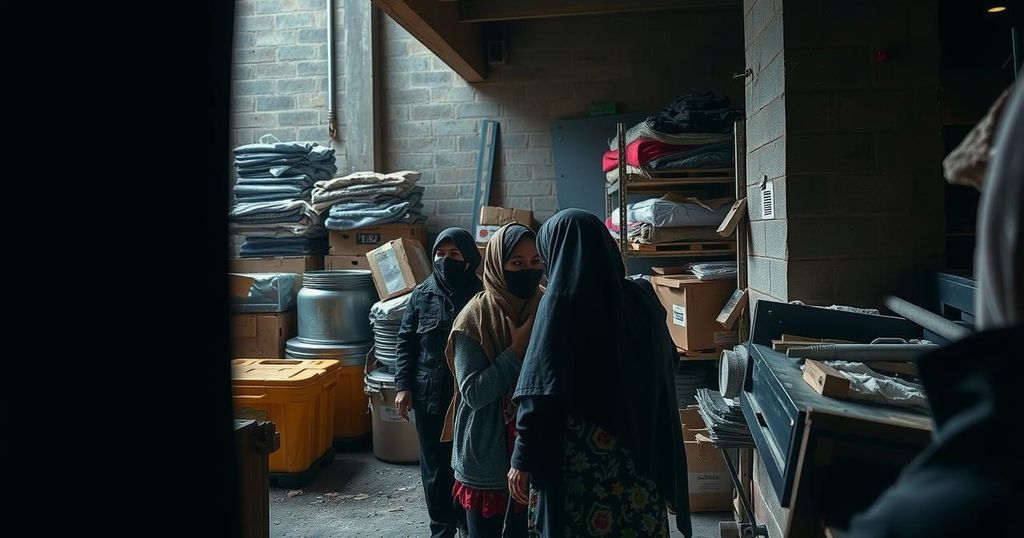Amidst escalating violence in Lebanon, numerous Sierra Leonean women, including Jaiatu Koroma and her infant daughter, have sought refuge in a warehouse shelter in Beirut. The ongoing conflict has led to the displacement of over one million people and highlighted the exploitation faced by migrant workers under Lebanon’s kafala system. With growing numbers of women seeking help, volunteers are working tirelessly to provide necessary assistance and support for their safe repatriation to their home country.
In the wake of escalating violence in Lebanon, numerous women from Sierra Leone, including 21-year-old Jaiatu Koroma and her infant daughter, have sought refuge in a makeshift shelter situated in a dilapidated warehouse on the outskirts of Beirut. Koroma, who fled from southern Beirut due to heavy bombardments, described her harrowing experience of initially sleeping in the streets before being taken to the shelter, which is now furnished with basic amenities such as mattresses, blankets, and diapers. The alarming situation arose following intensified conflicts between Israeli forces and Hezbollah that erupted on September 23. This violence has forced more than one million people to flee their homes, culminating in significant casualties—over 2,546 individuals have died, with most fatalities occurring in the last month alone. The women in this shelter bond over shared experiences, while some engage in domestic tasks such as laundry within the nearly empty space, where bright clothes hang to dry. Jaiatu Koroma lamented her lost employment in Lebanon, stating that her agent misappropriated her wages and withheld her passport. The Sierra Leone consulate in Beirut, represented by Jaward Gbondema Borniea, confirmed that many nationals are stranded due to ongoing conflicts and abusive labor conditions, emphasizing that a large number of Sierra Leoneans come to Lebanon to support their families back home. The controversial “kafala” system, which governs the employment of migrants, has been condemned for facilitating exploitation and abuse. Mathieu Luciano from the International Organization for Migration reported receiving 15,000 requests for repatriation assistance from migrants affected by the war. Approximately 17,500 migrants, out of the 180,000 who lived in Lebanon prior to the crisis, have been displaced. Over the past three weeks, the shelter has expanded from accommodating 60 women to now housing 175, as noted by one of the volunteers, Dea Hage Chahine, who expressed a continuous effort to meet the increasing demands of the influx of women needing medical and psychological support. Amidst the chaos, Susan Baimda, another shelter resident, poignantly expressed her desire to return home to her four children in Freetown, whom she has only been able to see through video calls since she arrived in Lebanon three years ago.\n This tragic scenario illustrates the dire consequences of warfare and the exploitation faced by migrant workers, emphasizing the urgent humanitarian need for assistance and the protection of basic human rights.
The ongoing conflict in Lebanon, particularly the recent escalation of violence between Israeli forces and Hezbollah, has exacerbated the humanitarian crisis in the region. Over one million displaced individuals are now facing severe hardships as they flee from their homes, including many migrant workers from Sierra Leone who originally traveled to Lebanon seeking employment opportunities to financially support their families. These women often find themselves ensnared in the exploitative “kafala” sponsorship system, which grants employers excessive control and leads to widespread abuse. Human rights organizations have condemned this system for its role in perpetuating forced labor and lack of legal protections for workers.
In summary, the plight of Sierra Leonean women seeking refuge in a warehouse shelter in Beirut highlights the devastating impact of ongoing conflicts and the systemic exploitation inherent in Lebanon’s labor practices. As these women endure the hardships of war and seek assistance, it is critical for authorities and humanitarian organizations to address their needs and facilitate their safe return home, underscoring the importance of advocating for the protection of migrant workers’ rights.
Original Source: www.ndtv.com






